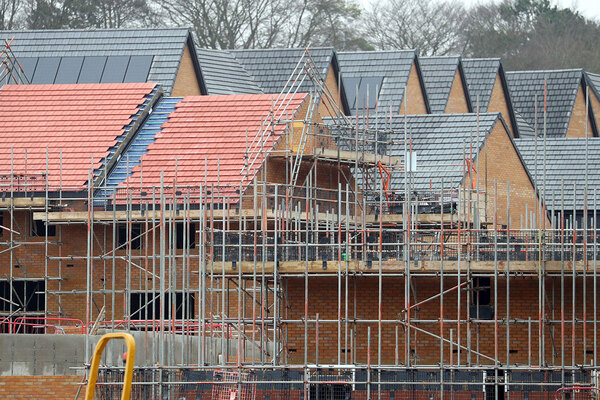What’s next on planning? The foundations are in place, now we need the bricks and mortar
We need to hear more about how Labour intends to fulfil its housebuilding promises, and who those homes will be for, writes Spencer McCarthy, chief executive of retirement property specialist Churchill Living
Later this month, official statistics will be published on net additional dwellings, covering the year to March. This should settle the question of whether the Tories built the one million houses they promised to deliver in the last parliament.
If official figures support the Tories’ calculations of success, it will heap pressure on the Labour government to deliver on its own housebuilding target of 1.5 million houses over this parliament.
The early signs are promising. Some called the recent Labour Party Conference, “a housing conference with a political party attached”, with Labour yimby events being some of the liveliest on the fringe circuit.
It stood to reason, following a manifesto that had “getting Britain building again” as a key policy pledge, backed by a Planning and Infrastructure Bill, and commitments to improve local planning decisions by modernising planning committees, building on brownfield sites and the grey belt.
The real challenge now is to follow through on these promises. Reforming planning committees is essential, and some would argue that a more drastic overhaul, possibly even abolishing them, could be necessary. Decisions on appeal are becoming standard procedure in our broken planning system, as opposed to being a measure of last resort as originally intended.
This is in danger of becoming a luxury for the big developers that small and medium-sized enterprises simply can’t afford. Indeed, it was for this reason that it was particularly encouraging to hear chancellor Rachel Reeves commit £3bn worth of support in guarantees to boost the supply of homes and support small house builders.
“Decisions on appeal are becoming standard procedure in our broken planning system, as opposed to being a measure of last resort as originally intended”
Churchill Living’s planning application for 47 retirement apartments in Romsey is a case in point of why the new government needs to tear up the red tape. Our application was initially recommended for approval by professional planning officers at Test Valley Borough Council, with the recommendation overturned by councillors at the Southern Area Planning Committee. During the process, the council’s witness, under cross-examination, conceded the council’s case could not be sustained. Hence, at the inquiry, the council concluded that it could no longer justify the reasons for refusal and that planning permission should have been granted.
The end result was that the council returned to its original position of approving the application. But in the meantime, by playing politics instead of applying planning law, that committee will have squandered tens of thousands of local council tax payers’ money on legal costs – money which could and should have been put to better use elsewhere.
This story of waste is something of a theme. New research by the Home Builders Federation shows that local authorities hold an estimated £8bn in unspent developer contributions, including £6.3bn of unspent Section 106 contributions and almost £2bn raised through the Community Infrastructure Levy.
As well as equipping the planning process to deliver sheer volume, we need to hear more about who Labour’s 1.5 million homes are being built for. Writing for Inside Housing while he was still leader of the opposition, Sir Keir Starmer explained his plans will “support 80,000 young people to get on the housing ladder over the next five years”, which is, indeed, a noble and important ambition. But the importance of purpose-built housing for older people must be made a priority.
In Homes for Later Living: A Plan for Retirement Housing, a new report by the Fabian Society thinktank, Churchill Living outlines the importance of housing provision for older people. The fact is, recent data from the Office for National Statistics shows the number of centenarians has more than doubled since 2002. And we know that over the next 15 years, the number of over 75s in the UK will increase by just under 50%, going from roughly six million to nine million.
“Providing purpose-built retirement living homes is not just about meeting individual needs; it’s about creating a housing ecosystem that supports mobility within the market”
While supporting young people in their pursuit of homeownership is crucial, we must also recognise that housing operates as an interconnected ecosystem. Increasing the availability of purpose-built retirement living options is vital, as it encourages older homeowners to downsize, which not only benefits them through suitable living arrangements, but also releases larger homes back into the market for younger families.
Providing these homes is not just about meeting individual needs; it’s about creating a housing ecosystem that supports mobility within the market. Key recommendations include increasing the supply of retirement housing to at least 30,000 units annually, implementing a stamp duty exemption for those downsizing, reducing the costs associated with delivering this type of housing, and obliging councils to proactively plan for their ageing communities.
These measures will alleviate pressure on the housing market, while supporting first-time buyers and enhancing community well-being.
Now established in office, the Labour government has the opportunity to implement a more comprehensive and considered housing strategy than we have seen in decades; one that prioritises the needs of all generations and ensures a more equitable housing landscape for everyone.
Spencer McCarthy, chief executive, Churchill Living
Sign up for our development and finance newsletter
Already have an account? Click here to manage your newsletters













